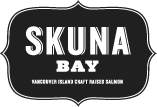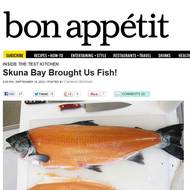From Bon Appetit's "The Feed: Inside the Test Kitchen" Blog. Click here for the link: http://www.bonappetit.com/blogsandforums/blogs/badaily/2012/09/skuna-bay-salmon-vancouver.html
Posted by Cameron Berkman, photos by Cameron Berkman
As we've mentioned before on the site, we--people, in general--are not very good at sustainable fishing. (Sorry about that, cod. Apologies, tuna.) But the kindly Canucks from Skuna Bay Salmon are an exception. They recently stopped by the BA Test Kitchen along with Top Chef alum Angelo Sosa to walk us through their model for farming and harvesting sustainable salmon--and to show us the goods.
Starting in the water (as most fish do) the salmon are raised in the clean, glacier-fed ocean off of Vancouver Island. Their feed contains less than 25% fish oil or fish meal (a hotly debated processed fish product) and the all-important fish-in-fish-out ratio is approaching 1:1, meaning every fish that they harvest has a buddy in the ocean. This is very good and very rare.
After the fish are painstakingly selected and harvested by "salmon inspectors," they are shipped in recyclable boxes marked with tamper-proof tape and a handwritten label noting who packed the box. Skuna Bay asks that the distributors do not open the boxes and fillet the fish--they want chefs to see the entire product. At the moment, the salmon is mostly only used by restaurants, but they have started cropping up at retail spots on the west coast and if they look as good as they did in our kitchen, distribution of the fish should spread quickly.
All this environmental mumbo-jumbo is great, but what matters in the end is taste. Fortunately, Chef Sosa expertly filleted one and we can assure you that the meat is firm, the fat and oil content are well-balanced, and the taste is unmistakably clean and fresh (we had a bit of a sashimi party in the kitchen).
Sure, the farming and harvesting process is tedious, and as a result the price point is higher, but it hasn't scared off too many clients. Most importantly, Skuna Bay is proving that it's possible to build a sustainable business model on sustainable fish.
And have it taste great.

